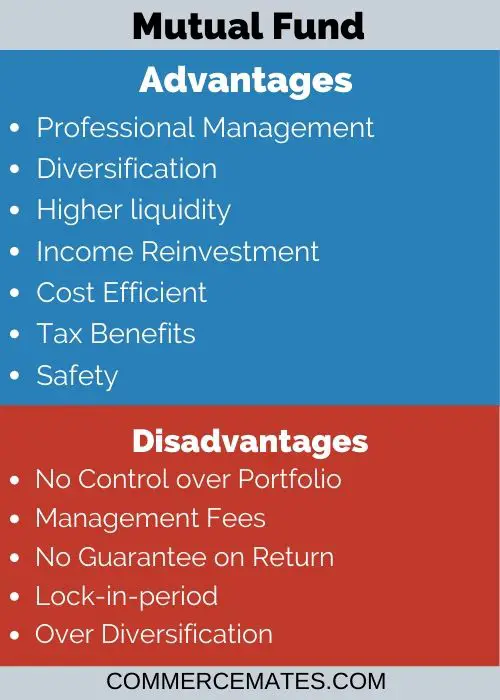Contents
Meaning of Mutual Fund
Mutual fund is an investment tool consisting of a portfolio of stocks, bonds, money market instruments or a combination of all. It is a means through which different investors are able to come together and invest their money into professionally managed investments.
Mutual funds pool the money of different investors for purchasing securities. All funds invested by investors in the mutual funds are monitored and invested by highly professional managers. It provides small investor access to secured and diversified investment at low prices.
Investors are charged an annual fee which is termed as expense ratios for investment in mutual funds. Each individual shares profit or loss of mutual fund in proportionate of their invested amount. Mutual funds are of different types such as Equity funds, Debt funds, index funds, income funds, balanced funds, Money market funds, Specialty funds, and Funds of funds.

Advantages of Mutual Funds
Professional Management
Mutual fund investments are managed by professional managers. These managers have great knowledge and properly analyze various investment avenues before investing any amount in them.
Diversification
This investment tool provides diversification of risk by investing in varied securities. Mutual fund portfolio holds securities of different types that help in the spreading of risk. If one asset of a portfolio does not perform well, then it can be compensated with higher returns from other assets.
Higher liquidity
Mutual funds offer higher liquidity to investors due to their ability to convert into cash easily. Investors can enter or exit mutual funds as per their convenience without any restrictions.
Income Reinvestment
It allows you to reinvest your dividend or interest earned from securities into the portfolio. Mutual funds provide you an opportunity to invest in additional fund shares and grow your portfolio without paying any transaction fees.
Cost Efficient
Mutual funds are a cost-efficient type of investment. The expenses associated with mutual fund transactions are quite low that is 1% to 2% of expenses ratio.
Tax Benefits
It provides more tax benefits to investors as compared to other types of investments. Investors under section 80C can invest up to 1.5 lakh in tax saving mutual funds. In addition to it, the individual enjoys several other tax benefits.
Safety
Another important advantage of mutual funds is the safety of the investment. All mutual fund companies work under the regulations of a statutory government body that is SEBI. They need to disclose their full information that provides transparency to investors.
Disadvantages of Mutual Funds
No Control over Portfolio
Investors don’t have any control over their investment funds in the mutual fund portfolio. Mutual funds are managed and controlled by professional fund managers.
Management Fees
Investors need to pay a fee to fund managers for their management services. These fees charged increases the expenses to the investors.
No Guarantee on Return
Mutual funds do not offer any guarantee of returns to investors. Investments in mutual funds are subject to market risk.
Lock-in-period
Funds in mutual funds get locked for longer time periods that may range from 4 to 6 years. Investors cannot withdraw their funds from such investment before the maturity period.
Over Diversification
Another disadvantage of investing in mutual funds is the over-diversification of the portfolio. Diversification of portfolio may result in the spreading of risk but the return cannot be maximized. Also, the management of a highly diversified portfolio becomes quite difficult.